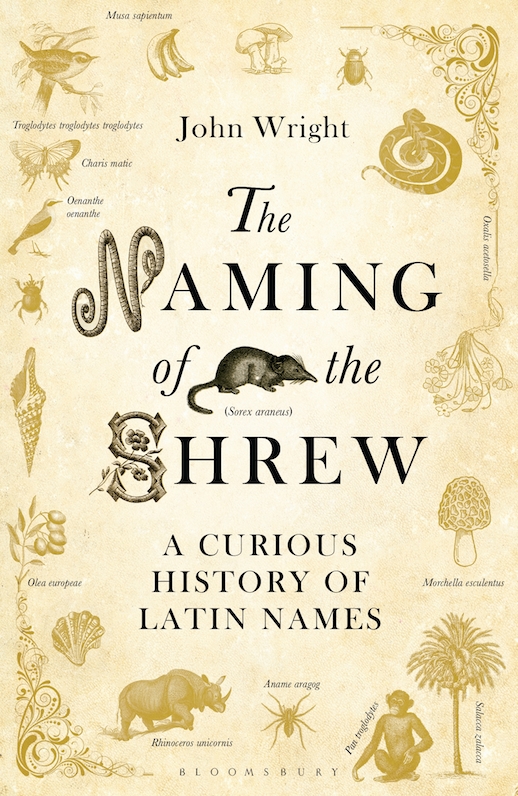John Wright; The Naming of the Shrew – A Curious History of Latin Names (Bloomsbury)
320 pages, hardback
Review by Kev Parr
I feel something of a fraud to be reviewing a book that I am only halfway through, but ultimately I would be letting people down if I didn’t.
You see, as I was reading a few pages last night I realised that this would be rather a nice book to find sanctuary in during that post Christmas lull. That time when relations begin to get on your wick and any child under ten will be so charged up with sugar and video games that tantrums seem to come every few minutes. It is always nice at such moments to gently retreat and find a quiet corner – there to switch off, breathe deeply and let your ears stop bleeding. At such times a book is the perfect accompaniment. Anyone finding you will leave you be and putting your mind in a different world for half an hour will lessen the likelihood of doing time for child battery.
This Christmas I shall be reading the second half of The Naming of the Shrew, and it will likely save my sanity. Of course, were I to tell people this in the New Year and then brag about how easily I sailed through the festive madness then I would be doing a disservice. People need to know about this book now – while there is still time for all of us.
John Wright is known to many as the mushroom man. For years he has popped up on the River Cottage programmes showing Hugh Fearnley-Whittingstall how to tap birch trees or find a fungal feast without the need for a new liver. His demeanour is wonderfully inoffensive. He moves with gentle purpose and speaks with restrained enthusiasm that is betrayed by an ever-present twinkle in his eye. Such an easy-going nature transfers perfectly onto paper as I have found in his previous books. Written under the River Cottage moniker, his book on Mushrooms is thumbed to the point of damage and rarely makes it back to the bookshelf. I read it cover to cover every August, when my fungi season begins, and still I smile at his turn of phrase.
It is John’s slightly languid style that brings such a gentle rhythm to his subject, and The Naming of the Shrew is no different. Beautifully designed, this is a no-stone-unturned study of Latin Names – their origins and meanings and the tales of the people who created them. It would be a subject easy to get bogged down within, but John nudges us along with a wry grin and weaves a structure through a thousand facts that could easily be lost in a run-of the mill reference book.
Because he cares about the subject and so thoroughly understands it, but more importantly because he understands people, John has us reading at the pace at which he might speak. I am halfway through but I have read every word. There are no pages that you turn without thoroughly ingesting and yet at no point do you feel pressure that there may be a test at the end of it. These are lessons and tales to simply be enjoyed, and the author is taking clear pleasure in telling them.
I could of course tell you how Frank Zappa lends his name to a genus of Goby or about a species of midge named after The Grateful Dead but these are nuggets that you will find for yourself. And when you are reading The Naming of the Shrew in the broom cupboard on Boxing Day, suitably oblivious to the carnage outside, remember to forgive me for delivering a review of just half a book.
